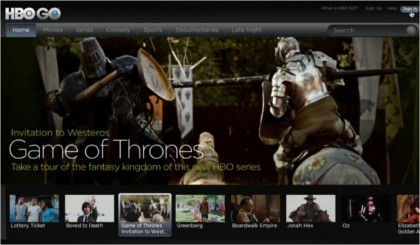
As much as people like to hold Netflix up as a competitor to cable TV, the truth is it’s much more akin to HBO in both value and price. The one big difference between the two is HBO’s steadfast determination to tie its distribution to cable subscription packages. On that front, the company got another boost today with the official launch of the HBO Go and MAX Go (Cinemax) apps for Charter subscribers. These Internet apps mean authenticated users can get HBO and Cinemax shows virtually anywhere. And with Charter on board now, the only big players without mobile HBO on the docket are Cablevision and Time Warner Cable.
HBO is following in ESPN’s footsteps, proving that good content can dictate carriage in the online world as much as it can in the traditional pay-TV space. However, the more HBO expands its online content, the more it sets itself up as a direct rival to Netflix. Both are roughly the same price, and offer a mix of great content along with some middling stuff. HBO distinguishes itself in the original content domain, but even there, Netflix is looking to make its own waves. So the question becomes, are people more likely to pay for something separate from cable, or for a bundled cable add-on? And if we want both, just how high do we think we can we stretch the monthly entertainment budget?
Frontier FiOS isn’t onboard with HBO Go either.
The strangest omission to me is Time Warner. Time Warner owns HBO, but Time Warner’s own cable customers with HBO subscriptions don’t get access to HBO GO. WTF?
Time to face the music armed with this great informtaoin.
Josh, do some homework. Time Warner Cable is not part of Time Warner.
26GHz Intel Core i5-450M processor with Turbo Boost Technology – A· 14.
Getting financing for an HP laptop can be a real struggle, especially if you have credit.
Laptop computer or notebook is a device that provides multi utility along with
mobility and seamless wireless connectivity.